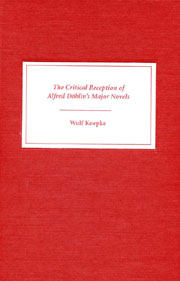Preface
Published online by Cambridge University Press: 05 February 2013
Summary
ALFRED DÖBLIN belonged to the generation of Thomas and Heinrich Mann, Franz Kafka, Carl Sternheim, Lion Feuchtwanger, and Hermann Hesse. He was a prolific writer in many genres, but he is primarily remembered as a novelist. The experimental nature and the complexities of his texts have earned him the praise of many writers and critics, but only one of his major novels has enjoyed enduring popular success internationally: Berlin Alexanderplatz (1929), which was hailed as the outstanding German big-city novel and as a German equivalent to the narrative strategies of James Joyce's Ulysses and John Dos Passos's Manhattan Transfer. Döblin is recognized as one of the leading German prose writers of the twentieth century, and his impact has been acknowledged by no less a writer than Günter Grass, who has praised Döblin as “my teacher.”
But the reception of Döblin's works was severely hampered by his exile in 1933, and by the reluctance of German publishers after 1945 to reacquaint readers with his texts. The considerable but belated scholarly attention given to Döblin's works has not translated into popular success, and among them only Berlin Alexanderplatz is widely known to the public, not least because of Rainer Werner Fassbinder's monumental television series of 1979. So Alfred Döblin, despite being recognized as one of the great German writers of the twentieth century, remains virtually unknown to the reading public.
This book traces the reception of Alfred Döblin's major novels, which, despite lack of popular success relative to Alexanderplatz, are still debated by scholarly critics.
- Type
- Chapter
- Information
- The Critical Reception of Alfred Döblin's Major Novels , pp. vii - xPublisher: Boydell & BrewerPrint publication year: 2003

